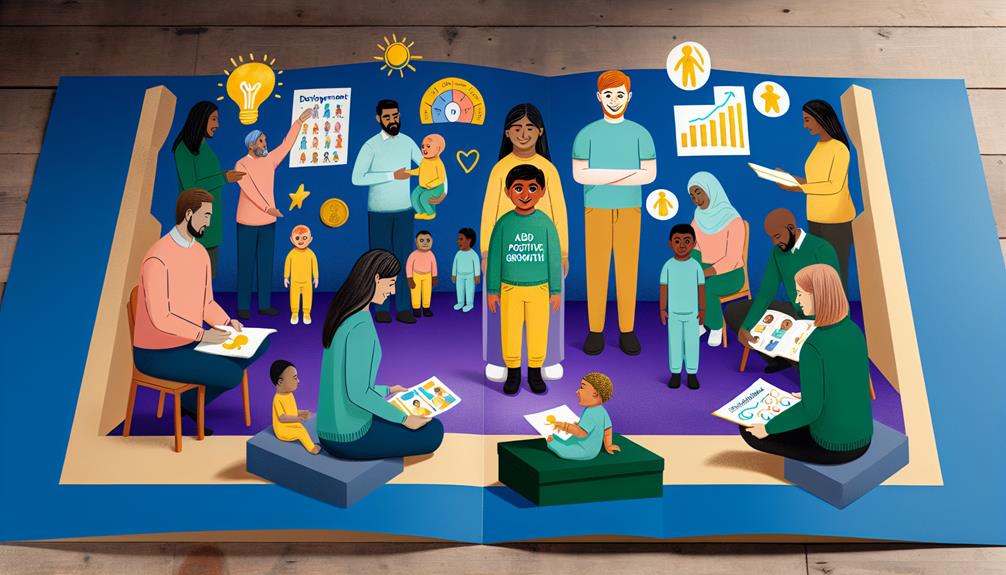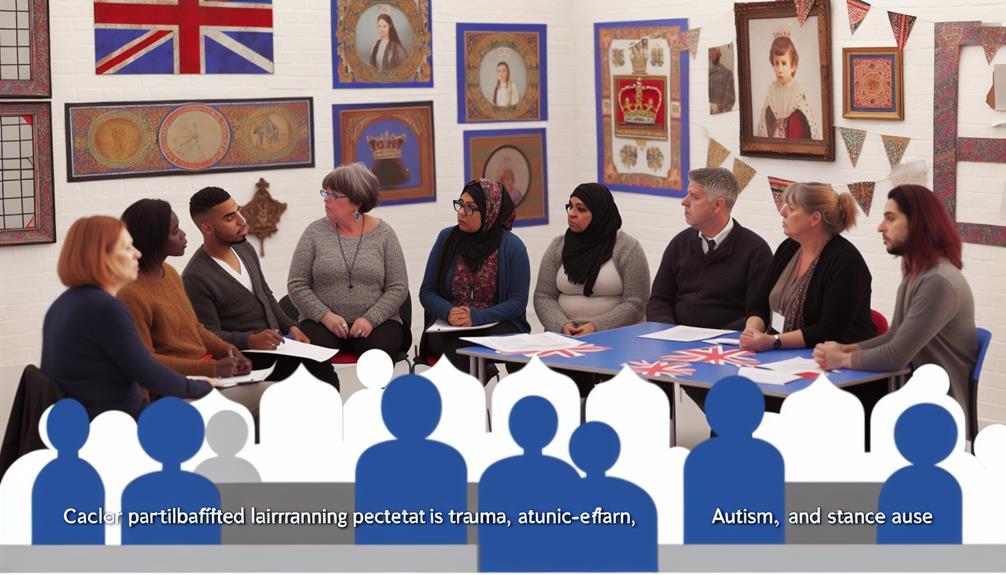UK foster care training programs are crucial for you as a prospective foster parent. They provide the essential knowledge and practical skills you'll need to navigate the complex system of foster care laws and regulations securely. Truly, the training's an investment, focusing on child development, trauma understanding, behavior management and more. This equips you to foster a safe, nurturing environment for children and contribute strongly to their long-term well-being and personal growth. Seeing success stories of foster parents and children transformed through the training programs, it's apparent that these programs are indispensable. Stick around, there's plenty more to learn.
Key Takeaways
- Foster care training programs equip foster parents with essential knowledge about the foster care system, child psychology, and trauma effects.
- They enhance practical skills like communication, conflict resolution, and financial management, ensuring a safe and nurturing environment for foster children.
- The training contributes to the long-term well-being and personal growth of foster children, improving emotional stability, social skills, and academic achievement.
- Understanding legal aspects through these programs helps foster parents navigate the complex foster care system and handle legal challenges efficiently.
- Continuous learning through these programs builds parental resilience, fosters meaningful connections with children and keeps foster parents updated with latest research and developments.
Understanding UK Foster Care

To grasp the significance of foster care training programs in the UK, you first need to understand the ins and outs of the UK's foster care system itself. It's not as simple as the common foster care myths would have you believe. The system is a complex network of laws, regulations, and procedures designed to protect and nurture children who can't live with their birth families.
You see, adoption procedures are only the tip of the iceberg. Before a child can be adopted, they're often placed in foster care, a temporary home where they can find stability and support. There are different types of foster care, including emergency, short-term, and long-term placements, each with its unique challenges and requirements.
Contrary to popular belief, you don't need to be married, own a home, or have a certain level of income to become a foster parent. In fact, it's the quality of care, commitment, and love you can provide that truly matters. And that's where foster care training programs come into play. They equip you with the skills and knowledge needed to provide the best possible care for these vulnerable children.
Significance of Foster Care Training
Understanding the importance of foster care training programs, you'll find that these initiatives are more than just a prerequisite for becoming a foster parent – they're an indispensable tool that shapes competent, caring, and confident foster parents. Pivotal in developing the necessary skills, these programs guarantee that you can provide a safe, nurturing environment for vulnerable children.
Training effectiveness often hinges on curriculum design, which is thoughtfully tailored to meet the specific needs of foster children. This design encompasses core areas such as understanding trauma, managing challenging behavior, and promoting positive relationships. As a result, the training equips you with the knowledge to respond to the unique situations that fostering often presents.
The significance extends beyond the immediate benefits too. Successful foster care training contributes to the long-term well-being of children, providing them with stability and the opportunity for personal growth. Through your learning, you're not just becoming a better foster parent, but you're indirectly enhancing the life of a child who's in dire need of love, care, and understanding.
In essence, foster care training programs are indispensable, not only shaping you into a capable foster parent, but also creating a positive impact on the lives of the children you foster.
Core Components of Training Programs

Diving into the core components of these training programs, you'll discover they're meticulously designed to arm you with the essential skills and knowledge required to excel as a foster parent. Here's what you can expect:
- Foundational Knowledge: You'll gain a thorough understanding of the UK's foster care system, its policies, and procedures. This knowledge is vital for maneuvering through the system effectively.
- Child Development and Psychology: Understanding the emotional, psychological, and developmental needs of children in foster care is key. This component focuses on how trauma, neglect, and abuse can impact a child's growth.
- Skills Training: Here, you'll learn practical skills for day-to-day fostering, like communication techniques, conflict resolution, and behavior management. This part of the program is often interactive, allowing you to practice and refine your skills.
- Training Evaluation: This is the stage where your learning is assessed. It provides feedback on your strengths and areas that need improvement, promoting your individual growth.
Enhancing Skills With Foster Care Training
You're about to understand the importance of enhancing skills through foster care training in the UK.
This training is pivotal as it helps develop core skills, preparing you to better handle the challenges that come with foster care.
Core Skills Development
In the domain of foster care, honing your core skills through specialized training programs becomes a beacon of hope, ensuring that every child's unique needs are met with understanding and compassion. These programs focus on key areas such as:
- Financial Management: You'll gain the ability to manage financial resources effectively, ensuring that the child's needs are adequately met.
- Time Organization: You'll learn to balance your time efficiently between various tasks, from managing appointments to maintaining a nurturing environment.
- Communication Skills: You'll develop the ability to communicate clearly and empathetically with children of all backgrounds and situations.
- Emotional Resilience: You'll be trained on handling stressful situations with grace, while ensuring the child's wellbeing.
With these skills, you're not just becoming a better foster carer, you're becoming a lifeline for the children in your care.
Training Program Importance
Undoubtedly, the value of comprehensive foster care training programs is immeasurable in enhancing your abilities to provide the best possible care for children in need. These programs help you to navigate the unique emotional, behavioural and social challenges that foster children may present, equipping you with the necessary skills to foster resilience and promote wellbeing.
Program evaluation plays a crucial role in measuring the effectiveness of these training schemes. It guarantees that you're not just going through the motions, but truly mastering the skills that matter. However, funding challenges often threaten the quality and continuity of these programs.
It's essential that stakeholders recognize the importance of these programs, ensuring they're well-funded, thereby empowering you to make a positive impact in a child's life.
Impact on Childs Development

Through participation in UK foster care training programs, a child's development can be greatly improved regarding emotional well-being, social interaction, and academic achievement. These programs are designed with an emphasis on child's resilience building and developmental milestones tracking.
Here's how foster care training impacts a child's development:
- Emotional Well-being: The training equips foster parents with skills to help the child manage their emotions, leading to improved emotional stability and resilience.
- Social Interaction: Foster care training includes lessons on social skills, enabling the child to build healthy relationships and interact effectively with their peers.
- Academic Achievement: The programs incorporate educational support, helping the child achieve their academic potential and meet their developmental milestones.
- Behavioral Development: The training includes behavior management techniques, reducing problematic behaviors and encouraging positive ones.
Emotional Support for Foster Parents
Beyond the impact on the child, foster care training programs also provide essential emotional support for you as a foster parent, equipping you with the necessary tools to navigate the unique challenges that come with this role. These programs emphasise the importance of parental self-care, understanding that your emotional well-being is vital in guaranteeing a nurturing environment for the child.
Through the use of trauma-informed strategies, training programs can help you understand and manage the emotional turbulence that often accompanies fostering. They offer you guidance on how to deal with the aftermath of traumatic experiences and how to respond to the emotional needs of children who've been through hardship.
But importantly, these programs also provide support for your own emotional needs. They create a network of fellow foster parents, social workers, and professionals who understand your journey and can offer practical advice, empathy, and reassurance. You're not alone in this; there's a community ready to stand with you, offering comfort and understanding.
In a nutshell, UK foster care training programs do more than prepare you for the legal and practical aspects of fostering. They ensure you're emotionally equipped to provide a safe, loving home for children in need.
Legal Aspects in Foster Care Training

Understanding the legal aspects in foster care training isn't just essential—it's a necessity for your journey as a foster parent.
You're not only tasked with providing a nurturing environment, but also with safeguarding the rights of the children in your care.
Understanding Foster Care Laws
Before diving into the intricacies of foster care training, it's essential for you to grasp the legal aspects that govern this sector in the UK. Understanding foster care laws not only protects the rights of the child but also helps you in fulfilling your parental responsibilities effectively.
Let's focus on four key areas:
- Adoption procedures: You need to comprehend how adoption laws work, the eligibility criteria, and the process involved.
- Parental responsibilities: These laws outline your duties and obligations towards the foster child.
- Foster care licensing: You must understand the rules and regulations for becoming a certified foster parent.
- Placement processes: This involves laws on how a child is placed into foster care.
With this knowledge, you'll navigate the foster care system more confidently and proficiently.
Rights of Foster Children
As a potential foster parent, it's important that you're well versed in the rights of foster children, an essential component of your foster care training. Understanding these rights is a cornerstone in child advocacy. Foster children have the right to be treated fairly, to have access to healthcare, education, and to maintain a connection with their birth family, where appropriate. It's vital that you respect and uphold these rights in your role.
The adoption processes in the UK also emphasize the child's rights. You'll be trained to understand the legalities surrounding the adoption, guaranteeing the child's welfare remains paramount. This knowledge won't only ensure you're fostering responsibly, but also empower you to act effectively and empathetically as an advocate for your foster child.
Handling Legal Challenges
How prepared are you to navigate the complex legal challenges that can arise during foster care? UK foster care training programs equip you with the necessary knowledge to handle these situations. They illuminate the legal implications and educate you about the foster rights you need to uphold.
- They provide a thorough understanding of the legal aspects of foster care.
- These programs make sure you're knowledgeable about the rights of the child and the responsibilities of a foster parent.
- They prepare you for potential legal challenges and how to deal with them effectively.
- Finally, they offer guidance on the support available to you from the legal system.
This training is essential, equipping you to meet challenges head-on, while safeguarding the welfare of the child in your care.
Specialized Trainings for Complex Cases

In dealing with complex cases, you'll find that specialized training programs can truly catapult your fostering skills to the next level, equipping you with the necessary expertise to handle unique challenges. This includes topics like trauma-informed care and therapeutic interventions, both of which are integral in preparing you for these scenarios.
Trauma-informed care is an approach that understands, recognizes, and responds to the effects of all types of trauma. As a foster parent, you'll learn strategies to support children who've experienced traumatic events, helping them to feel safe and rebuild a sense of control over their lives.
Therapeutic interventions, on the other hand, offer you an assortment of tools to address specific behavioural and emotional issues. These techniques can range from play therapy to cognitive-behavioural approaches, each designed to help a child process their experiences, develop healthy coping mechanisms, and foster their emotional growth.
Continuous Learning for Foster Parents
Beyond mastering specialized trainings, it's important to understand that your learning journey as a foster parent doesn't end there. Continuous learning is vital to increase your parental resilience and ability to foster relationships.
The need for continuous learning can be broken down into four key areas:
- Updating Knowledge: Foster care best practices evolve. Stay informed with the latest research and developments. This guarantees that you provide the best care possible.
- Enhancing Skills: As you gain experience, you'll identify areas where you want to improve. Continuous learning helps you refine your skills and responses.
- Building Resilience: Parental resilience isn't something you're born with—it's developed. Training programs can help you build your resilience, enabling you to better weather the ups and downs of foster parenting.
- Fostering Relationships: Learning how to foster relationships is crucial. The ability to form meaningful connections with your foster child can greatly impact their experience in your care.
Success Stories From Training Programs

Undoubtedly, the transformative impact of foster care training programs emerges vividly in the success stories of foster parents and children alike. Program evaluations speak volumes about the compelling improvements in foster parents' abilities to handle challenging situations, and the children's remarkable progress in their emotional wellbeing.
You've seen personal reflections of foster parents who, thanks to these training programs, have grown in confidence and capability. One foster parent, Emma, was initially overwhelmed by the behavioral issues of her foster child. After the training, however, she gained the skills to address such concerns effectively. Emma's story is just one of many.
The children, too, have their tales of triumph. Jack, placed into foster care at a young age, struggled with trust issues. But the tireless efforts of his trained foster parents helped him heal and develop healthy relationships. Jack's story isn't unique; countless children have found renewed hope because of these programs.
In essence, these success stories are a confirmation of the profound value of UK foster care training programs. They underscore the necessity of such training, not just for the foster parents but, more importantly, for the children they care for. It's clear – these programs aren't just helpful; they're essential.
Frequently Asked Questions
What Financial Support Is Available to Foster Parents in the Uk?
You're entitled to financial assistance in the UK as a foster parent. Eligibility varies, but support packages offer a variety of funds for child maintenance, training, and additional needs. It's vital to research your options.
How Does the UK Foster System Compare to Other Countries?
You'll find the UK's foster system notably differs from others due to international adoption policies and cultural differences in foster care. It's built on strong training programs, ensuring quality care for every child in the system.
What Is the Average Duration of a Child's Stay in a Foster Home?
Stay statistics reveal that a child's average stay in a UK foster home is about 22 months. This can greatly impact their emotional well-being. You'd need to understand this to fully grasp the system's complexity.
Are There Any Age Restrictions for Becoming a Foster Parent in the Uk?
Yes, to become a foster parent in the UK, you must be over 21. However, parenting experience and understanding foster care challenges are equally essential, regardless of your age. Age doesn't define your capability.
How Does the Foster Care Training Impact the Overall Health of the Child?
Foster care training enhances your effectiveness, boosting a child's resilience. It equips you with skills to handle unique challenges, promoting the child's overall health emotionally, physically, and socially. You play a vital role in their journey to recovery.
Conclusion
To sum up, you've got this. UK's foster care training programs are crucial, providing you with the armor you need to face the dragon of foster parenting. They build your skills, help navigate legal mazes, and offer specialized training for complex cases.
Remember, learning doesn't stop here. There are numerous success stories to inspire you. So, buckle up and let this training be your DeLorean, preparing you to impact a child's life positively.




